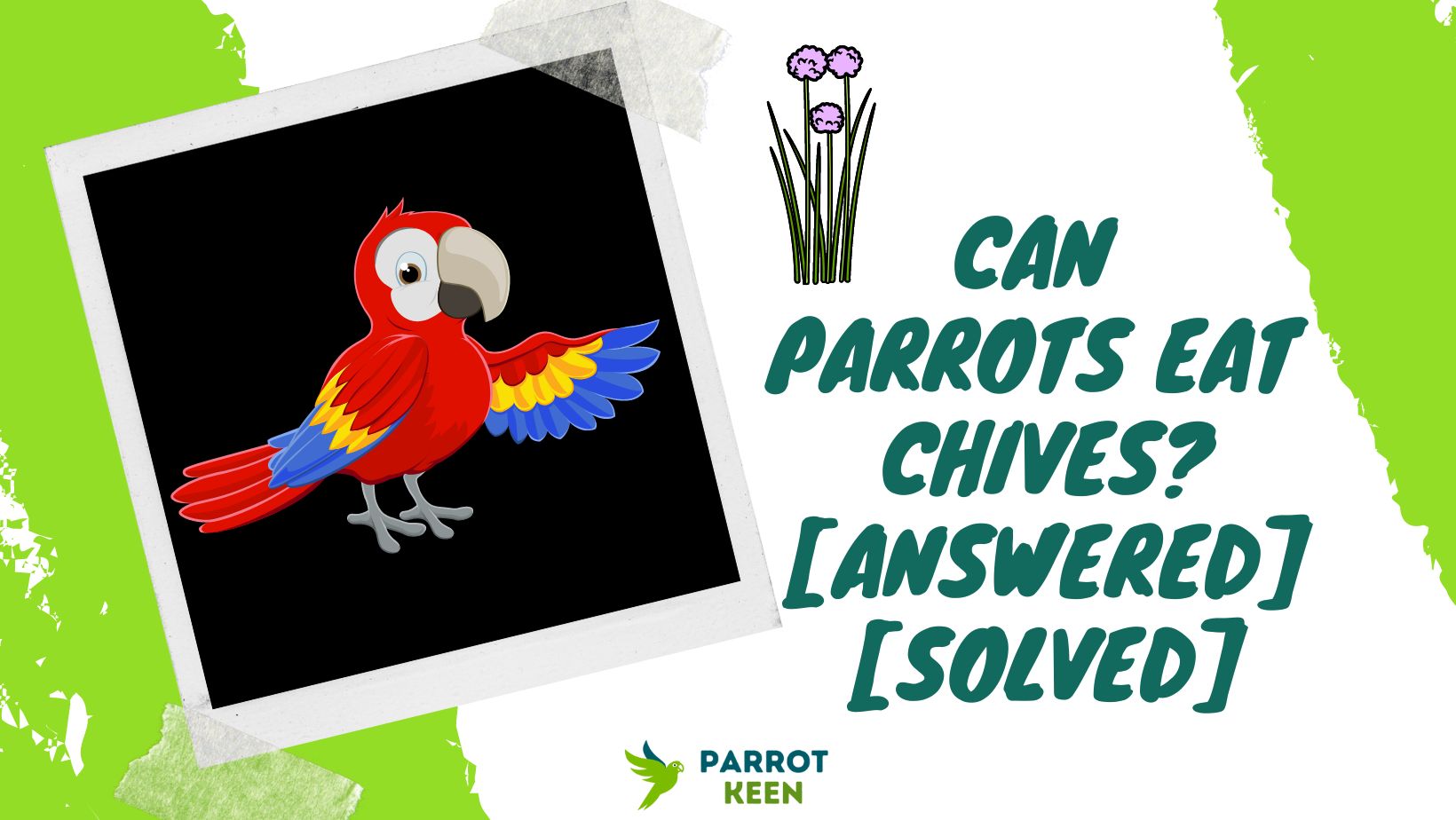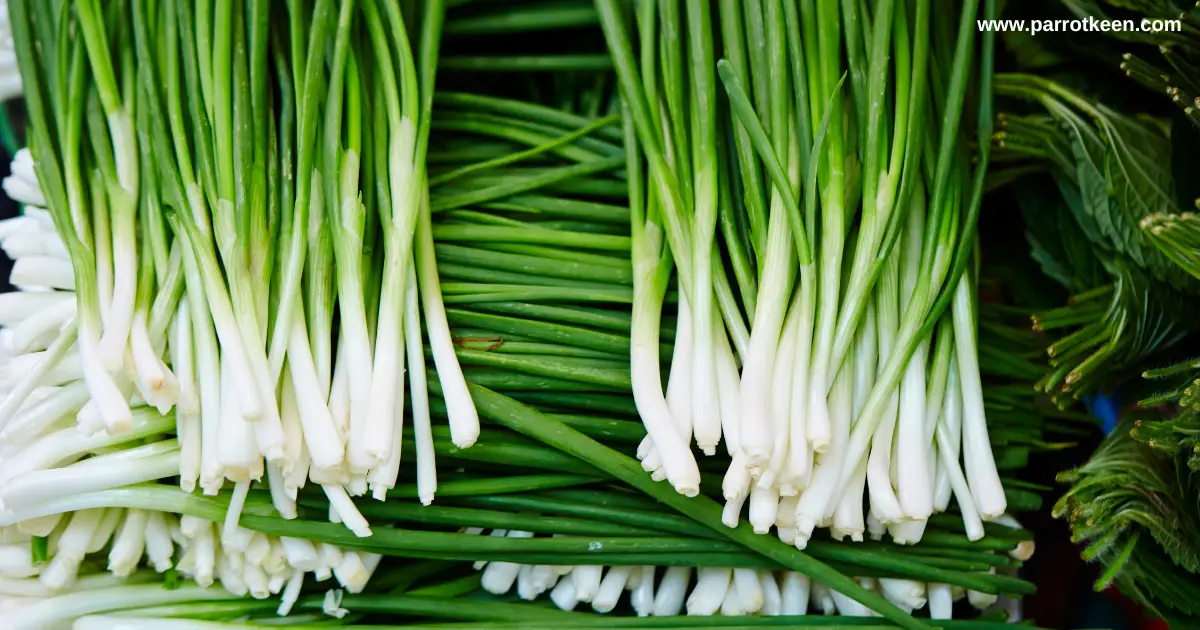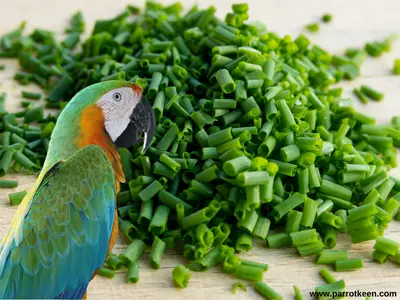
Can Parrots Eat Chives?
Do you have a parrot at home? If so, do you know what foods are safe for them to eat?
If you’re like me, you might wonder if sharing your chives with your parrot is safe. After all, they’re close relatives of the onion family, right? Well, wonder no more!
In this post, we’ll look at whether parrots can eat chives and provide tips on how to feed them this tasty herb safely.
We will also take a look at the parrot’s diet and discuss some of the foods that are safe for them to eat.
So read on to find out more!
What Are Chives?

Chives (Allium Schoenoprasum) are a species of flowering plant in the onion family. They are related to garlic, leeks, and shallots. They are native to Europe, Asia, and North America.
The chive plant grows about 10-15 inches tall and has slender, cylindrical leaves; the leaves are hollow and have a mild onion flavor. The flowers are pink or purple and bloom in the summer.
Chives are used as a herb for their leaves, which can be snipped and used fresh or dried. They are commonly used in salads, soups, and a garnish.
They also have many health benefits. They are a good source of Vitamin C and antioxidants. Chives also contain compounds that have been shown to reduce inflammation and lower blood pressure.
Can Parrots Eat Chives?
Please avoid it if possible. As any pet owner knows, choosing the right food for your animal is important. Dogs and cats have specific dietary needs, and birds are no different.
While there are many common foods that are safe for parrots to eat, there are also some that should be avoided. Chives are one example of a food that can be harmful to parrots.
They belong to the onion family, and the green stems or scapes contain sulfur, which can be toxic to birds. In addition, chives can cause gastrointestinal irritation and may lead to liver damage.
For these reasons, it’s best to avoid feeding your parrot chives altogether. If you’re unsure about what foods are safe for your bird, consult a veterinarian or an avian specialist.
Are Chives Safe for Birds?
Some experts believe that chives can be downright toxic to birds, and as a result, they should be avoided completely. Other experts believe that small amounts of chives are safe for birds, but they should not be used as a primary food source.
Ultimately, the decision about whether or not to give your bird chives is up to you. If you decide to try them, be sure to monitor your bird closely for any adverse reactions.
As always, it is important to consult with your avian veterinarian before making any changes to your bird’s diet. They can offer guidance and help you create a healthy diet plan for your feathered friend.
Are Chives Safe for Parrots?
Chives are not safe for parrots to eat because of their high sulfur content. Sulfur is toxic to birds and can cause liver damage. It can also interfere with the absorption of other nutrients and lead to vitamin deficiencies.
Birds need a diet high in protein and vitamins and low in carbohydrates. Also, chives have high potassium content, so if your bird consumes too much, it could imbalance its electrolytes, causing hyperkalemia, weakness, and kidney disease.
In addition, the sharp taste of chives might cause stomach irritation in birds. If you want to give your bird a treat, offer chopped fruits or vegetables instead of chives.
Feeding Parrots: Never feed Garlic, Onions, or Leeks
Suppose you’re considering adding a parrot to your home. In that case, it’s important to be aware of the dietary needs of these beloved birds.
While they are omnivores and enjoy a variety of fruits, vegetables, and proteins, some foods should never be offered to parrots.
Garlic, onions, and leeks all belong to the Allium family of plants and contain compounds that can be toxic to birds. Even in small amounts, these foods can cause irritation and inflammation of a parrot’s digestive tract.
In severe cases, they may even lead to anemia or death. If you’re unsure about what to feed your parrot, it’s always best to consult with an avian veterinarian for guidance.
Following a few simple diet tips can help keep your feathered friend healthy and happy for many years to come.
Can Your Cockatiels Eat Chives?
Chives are not recommended for cockatiels. They can cause gastrointestinal distress and even death if ingested in large quantities. While a small number of chives may not be harmful, it is best to avoid them altogether.
If you must feed your cockatiel chives, be sure to do so in moderation and closely monitor your pet for any signs of illness. Cockatiels are curious creatures and may be tempted to nibble on chives if they see them growing in your garden.
Contact your veterinarian immediately if you suspect your cockatiel has eaten many chives.
Symptoms of chive poisoning include vomiting, diarrhea, lethargy, and difficulty breathing. With prompt treatment, most birds make a full recovery. However, it is always better to prevent chive poisoning by avoiding this common herb altogether.

Other Vegetables Safe to Eat for Your Cockatiels
Along with the standard cockatiel diet of pellets and seeds, you can also offer your feathered friend a variety of fresh fruits and vegetables. While not all plants are safe for cockatiels, there are a number of common household herbs that make a healthy and delicious treat.
Parsley, basil, and dandelion leaf are all safe for cockatiels to eat. They offer a nutritious way to add some variety to your pet’s diet. In addition to being a good source of vitamins and minerals, these plants can also help to boost your cockatiel’s immune system.
When feeding fresh greens to your cockatiel, be sure to wash them thoroughly and chop them into small pieces to avoid choking. With a little creativity, you can give your cockatiel a healthy and delicious diet.
Can Parakeets Have Chives?
No, do not give your parakeet chives, as they are harmful to birds. Some well-meaning pet owners believe they can improve their parakeet’s diet by supplementing their seed mix with fresh fruits and vegetables.
However, many of these items can actually be harmful to your feathered friend. Chives, for example, are part of the onion family and can cause stomach upset in parakeets.
In addition, the strong scent of chives may also irritate your bird’s respiratory system. While a few chives here and there probably won’t hurt your parakeet, it’s best to err on the side of caution and stick to a specially formulated bird-seed diet.
What Are the Side Effects of Chives On Parrots?
While they are safe for humans to eat, chives can be poisonous to pet birds if consumed in large quantities.
When consumed excessively, the most common side effects are vomiting, diarrhea, kidney issues, and other digestive problems. In severe cases, chives can cause anemia and respiratory distress.
If you suspect your bird has eaten too many chives, it is crucial to seek veterinary care immediately. While a few chive leaves will not likely cause any serious problems, it is best to err on the side of caution and avoid it.
Conclusion: Can Parrots Eat Chives?
Although we found that parrots cannot eat chives, this does not mean that you should avoid giving your bird fresh vegetables altogether.
In fact, many other types of vegetables are good for birds, including broccoli, kale, and carrots. When feeding your bird vegetables, wash them thoroughly and remove any stems or leaves that may be difficult for your bird to digest.
Have you ever fed your bird fresh vegetables?
If so, what kind did they like best? If you find this article helpful, please share it with your friends and family who love parrots!

Hi, I am Thersa and Welcome to ParrotKeen, your number one place to get all the information you need about your cute parrot. I hope You Find it useful.
